The 9 Best Pool Heaters of 2023
Dotdash Meredith and Yahoo Inc. may earn commission or revenue on some items through the links below.
Extend your pool season with these top picks
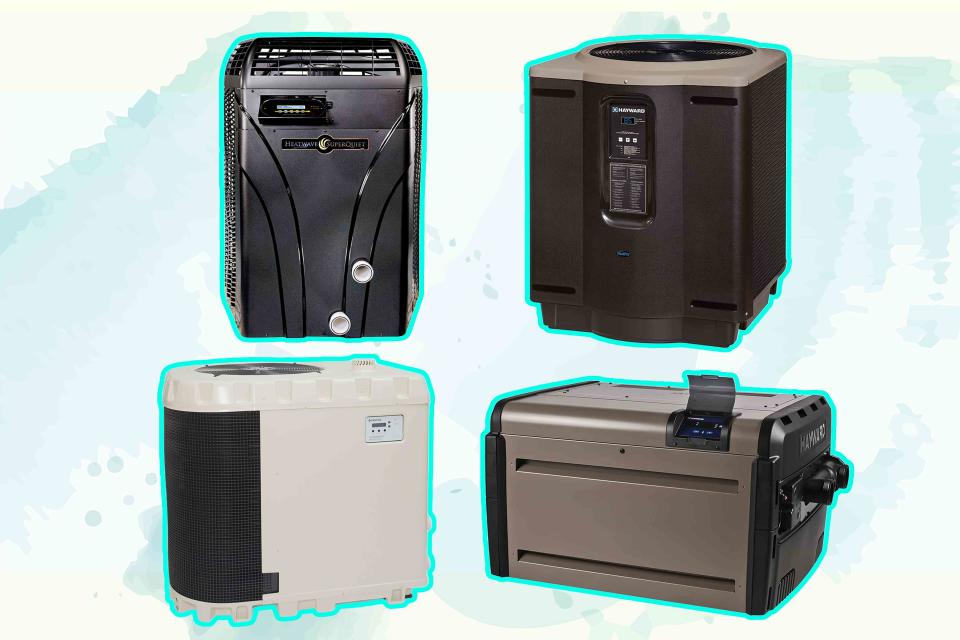
The Spruce / Brian Kopinski
A pool heater can help keep water at a comfortable temperature and can extend your backyard pool season into the colder months. Aside from heating a pool, many heaters can also take the water all the way down to the bone-chilling 50 degrees standard to a cold plunge, according to Terry Doyle, the product manager of heating for Fluidra, one of the leading manufacturers of residential and commercial pool equipment. Even if chilly water isn’t your thing, the ability to cool the water a simple 10 or so degrees can provide a more enjoyable pool experience, especially for those who live in more muggy areas or have endured recent years of record-breaking heat waves.
“A pool can get into the 90s just from the sun beating down on it,” said Doyle, who is also an engineer who has designed pool equipment for more than 40 years. Plus he adds, “The pool is not refreshing because of the humidity.”
When researching the best pool heaters, we looked for energy-efficient, durable products that could also extend your pool season by providing a range of heating and cooling options.
AquaCal Heatwave SuperQuiet SQ166R Heat Pump
Best Overall

What We Like
Heats or cools water
Compatible with in-ground, above-ground, and saltwater pools
Low decibel rating
Titanium heat exchanger has lifetime warranty
What We Don’t Like
Need PoolSync Wifi Controller to use app
Can take more than 24 hours to heat water by 20 degrees
Larger footprint
The AquaCal Heatwave SuperQuiet IceBreaker Heat and Cool Pump is our best overall pick, standing out for its range of features, relatively quiet operation, and versatility. Most of the top five pool brands make a heat pump that heats and cools pool and spa water. But the AquaCal Heatwave SuperQuiet IceBreaker Heat and Cool Pump is one of the quietest machines on the market, operating at 55 decibels. That’s about as loud as a household refrigerator, according to Yale University’s Environmental Health & Safety department.
Heat pumps are more efficient than gas heaters but can take hours to heat water. Thanks to AquaCal’s PoolSync app, you can solve this issue by adjusting the water temperature from anywhere via your smartphone. However, if you don’t already have one, you’ll need to buy AquaCal’s wifi controller to use the app. You can also prevent others from tampering with your settings at the pool by locking them in with a passcode, a feature popular with Homeowners Associations and people who manage rental properties. We also appreciate that this heat and cool pump can be used on in-ground, above-ground, and saltwater pools.
Heater/chiller combos typically cost more than a traditional heater, so you’ll appreciate the AquaCal’s lifetime guarantee on the titanium heat exchanger, the key component of this machine, and a significant upgrade from the traditional copper or cupronickel materials mid-level models use.
A final peace-of-mind is that the AquaCal is certified by the Air-Conditioning, Heating and Refrigeration Institute, which verifies that heat pump pool heaters meet the energy performance claims their manufacturers make. For the record, AquaCal is not as efficient as some of the heater/chillers made by the most respected pool brands, but it’s not far behind.
Price at time of publish: $6,262
Pool Type: In-ground, above-ground and saltwater | Power Source: Electric | BTU Output: 126,000 | Dimensions: 34 x 34 x 44 inches
Hayward W3H400FDP Universal H-Series
Best Budget
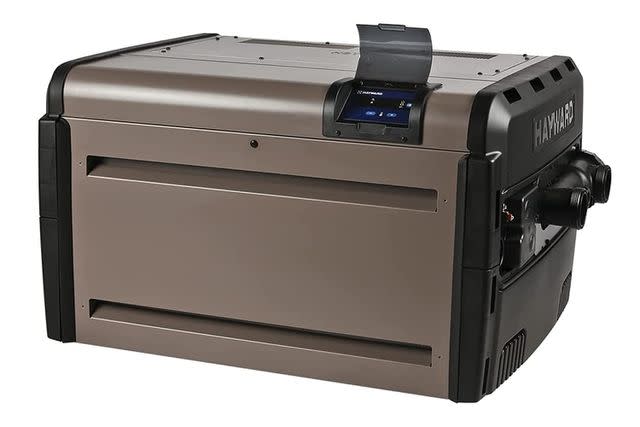
What We Like
Designed for gas or propane
Seven size/BTU options
Can be used in saltwater pools
Meets low nitrogen oxide emission standards
What We Don’t Like
Lower energy efficiency
Operated with keypad on device, not an app
The Hayward Universal-H series isn’t the type of heater to consider if energy efficiency is your top priority. With energy efficiency ratings in the low 80s, the Universal-H Series models are well below the 94-96 percent ratings on our best gas heater pick. Instead what you’re getting is a budget heater that’s focused on producing heat quickly. You’re also getting durability and ideally more longevity compared to other budget competitors. That’s because the Universal-H has a cupronickel heat exchanger that’s standard in mid-grade heaters, which tend to be more expensive.
The Universal-H is flexible in sizes—there are seven to choose from—and is also classified as a “Low NOx” heater that meets low nitrogen oxide emission standards. As regulations on gas appliances continue to tighten, the Low NOx heaters can be used in places like Southern California where air quality devices are required.
Price at time of publish: $3,669
Pool Type: In-ground | Power Source: Natural gas or propane | BTU Output: 400,000 | Dimensions: 39.6 x 32.8 x 30.6 inches
SwimEasy DIY High Performance Solar Pool Heater
Best Solar
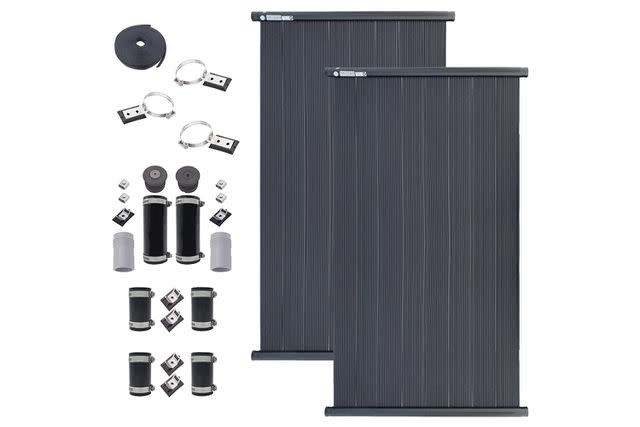
What We Like
15-20 year life expectancy
Flexible design you can customize
UV-resistant, durable solar collectors
Includes straps to secure collectors to rack or roof
What We Don’t Like
Needs constant sunny weather to function
Could be frustrating for those not into DIY projects
Larger pools require more space for solar collectors
If you love DIY projects, you might enjoy experimenting with the SwimEasy DIY High Performance Solar Pool Heater kit. We love that the flat black solar collectors are made from a special blend of UV-resistant polypropylene that is expected to last 15-20 years, as leaks are a common complaint about collectors made from more unreliable materials.
Place the collectors in an area with constant sun and attach them to a pump (not included) that will transport the water through the sun-heated collectors and back into the pool. The collectors can be placed on a rack next to an above-ground pool or on your roof if you need more space. Although this option includes two 4x8 foot panels, the kits come in many sizes. If this is your first attempt at solar, you can start small and add more panels, which are sold separately, if needed.
Price at time of publish: $852
Pool Type: In-ground or above-ground | Power Source: Solar | BTU Output: Not applicable | Dimensions: 4 x 8 feet per panel
Hayward HeatPro W3HP21004T Pool Heat Pump
Best Heat Pump
Less expensive than most gas pool heaters, a pool heat pump is a good alternative if you live in a warm weather climate.

What We Like
Titanium heat exchanger
Dual thermostat for pool and spa
non-corrosive design makes it durable, even in coastal areas
Relatively quiet
What We Don’t Like
Efficiency drops as temperature decreases
An electric heat pump is an alternative type of pool heater that uses ambient air to heat pool water. In warm climates, a heat pump is often more economical to operate than a gas pool heater or a conventional electric pool heater. The Hayward W3HP21004T is a popular choice that delivers up to 95,000 BTU and can meet the needs of heating an average to large swimming pool.
Hayward designed the HeatPro series of pool heat pumps to be durable and quiet, especially in comparison with some gas pool heaters. For example, the stainless steel fan blade is profiled to improve airflow efficiency while also reducing the noise factor during operation. An acoustic compressor cover also helps to dampen noise produced by this pool heater. Since this type of pool heater is especially popular in warmer climates that often come with increased humidity, a corrosion-resistant evaporator fin, and titanium heat exchanger help to extend the service life of this pool heater.
Price at time of publish: $4,669
Pool Type: In-ground | Power Source: Electric | BTU Output: 140,000 | Dimensions: 40 x 31.5 x 50 inches
Text Link:The 10 Best Pool Cleaners of 2023, Tested and Reviewed
Pentair UltraTempETi Heater
Best Electric/Gas Hybrid

What We Like
Combination electric and gas
Heat pump has a lifetime warranty
Titanium heat exchanger
Can operate via app
What We Don’t Like
Can take a hours to heat the water
The PentAir UltraTemp ETi is a hybrid pool heater that contains both a heat pump and gas-fired heater. You can alternate between four operating modes: gas only, heat pump only, dual or hybrid. The dual fires up both the heat pump and gas side of the machine to quickly boost the temperature. This flexibility is especially useful if your pool contains a spa. In just over half an hour, the UltraTemp can boost the water temperature 30 degrees in a 500-gallon spa. While a heat pump is more energy efficient, it can take hours to heat the water. The hybrid mode lets the machine do the work to automatically determine the most energy efficient gas/heat pump combination based on the temperature you want.
Like our best overall pick, the heat exchanger in the heat pump is made from long-lasting titanium and comes with a lifetime warranty. You can operate the heater from an app by using one of PentAir’s automation systems, which are sold separately.
Price at time of publish: $6,500
Pool Type: In-ground, above-ground and saltwater | Power Source: Electric and natural gas or propane | BTU Output: Not applicable | Dimensions: Not listed
Pentair UltraTemp High Performance Heat Pump
Best for Cold Weather
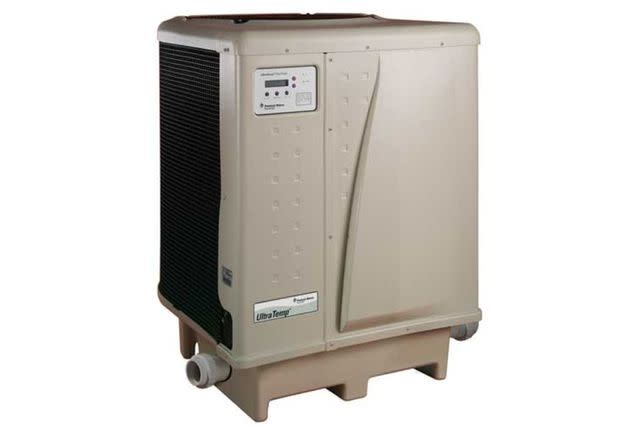
What We Like
Titanium heat exchanger
Automatic defrost feature
Dual thermostat for pool and spa
Available in various sizes
What We Don’t Like
Efficiency drops as temperature decreases
If your pool is in an area where you’re battling low temperatures, the automatic defrost option on the PentAir UltraTemp High Performance Pool Heat Pump series could help you extend your pool season. The defrost helps keep the pump’s refrigerant from freezing so your pump will keep working.
When choosing a heat pump, the U.S. Department of Energy recommends having a pool professional analyze your pool to calculate which size of heat pump will best fit your needs. You’ll likely need durable, energy-efficient options and that’s also where the UltraTemp series shines. There are BTU choices ranging from 50,000-143,000 (this option is 140,000 BTUs), and even two different color options if that’s important to you. All models in the series are certified by the Air Conditioning, Heating and Refrigeration Institute, which means PentAir’s energy efficiency claims have been independently verified and you have a reliable scale to consider when weighing energy efficiency options, which are measured by the unit’s coefficient of performance (COP).
Regardless of what model you choose, the UltraTemp includes a titanium heat exchanger, which is the most durable material on the market, and includes a lifetime warranty.
Price at time of publish: $5,631
Pool Type: In-ground and above-ground | Power Source: Electric | BTU Output: 140,000 | Dimensions: Not listed
Text Link:The 10 Best Pool Cleaners of 2023, Tested and Reviewed
PentAir ETi High-Efficiency Pool and Spa Heater
Best Gas

High efficiency
Titanium heat exchanger
Two size options
Propane conversion kit sold separately
While heat pumps have traditionally been more efficient than gas-fueled heaters, PentAir has designed a next-generation gas heater series that are 94-96 percent efficient. The company’s savvy pitch is definitely appealing to cost-minded consumers: 96 cents of every dollar you pipe into your pool or spa is spent on heating it.
The heaters come in two sizes that are able to produce 250,000 BTUs or 400,000 BTUs (this option is 400,000 BTUs). Both include a titanium heat exchanger that should extend the life of your heater and is an upgrade from PentAir’s MasterTemp gas heater series, which uses mid-grade cupronickel exchangers on its heavy-duty heater and low-end copper on the basic model. While the standard model is meant to be used with natural gas, you can buy a conversion kit that’s sold separately if you want to use propane.
Price at time of publish: $7,990
Pool Type: In-ground | Power Source: Natural gas with additional propane conversion option | BTU Output: 400,000 | Dimensions: 25 x 25 x 32 inches
Text Link:The 8 Best Above-Ground Pools of 2023
Hayward Universal HC Series
Best Gas or Propane
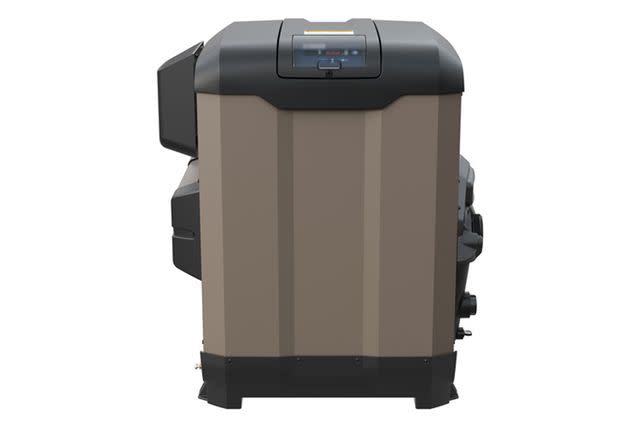
What We Like
Converts for use with gas or propane
Small footprint
Can be used indoors or outdoors
What We Don’t Like
Requires access to gas
Cupronickel heat exchanger
Only sold through pool professionals
If you have an existing gas-powered heater that needs to be replaced, the Hayward Universal Heater HC series is a no-fuss option, especially if you live in an area where supply chains are still disrupted and service people are scarce. Hayward is one of the top five respected brands and is widely available, increasing the likelihood that you’ll be able to get ahold of this heater if you’re in a time crunch. The caveat is that because it’s from Hayward’s Expert Line of products, you have to order through a pool professional, which you can do through Hayward.
The heater is purposefully designed to be small, compact, and serviced from an opening through the top so it can be used in tight spaces. This is especially helpful when replacing an existing heater, especially if your priority may be simply finding a machine that fits in your existing space. The cupronickel heat exchanger is not as good as titanium but is definitely a more durable upgrade from traditional copper that cheaper heaters use.
Price at time of publish: Varies
Pool Type: Indoor and outdoor in-ground | Power Source: Natural gas or propane | BTU Output: 400,000 | Dimensions: 28 x 21 x 31 inches
Our top recommendation for a pool heater is the AquaCal Heatwave SuperQuiet IceBreaker Heat and Cool Pump, a flexible machine that can either boost or lower your water temperature without making a lot of noise. Since it’s electric, it’s an excellent choice for areas where gas heaters are being phased out because of environmental concerns. For a more budget-friendly heater, we recommend the Hayward Universal H-Series because it is durable, heats the water quickly, and is available in different sizes and BTUs.
What to Look for in a Pool Heater
Installation
Pool and spas have traditionally been warmed by heat pumps or gas-fueled heaters. The heater is typically housed in an area with your other pool equipment called the pool pad. Water from your pool or spa is piped through the heater, warmed, and returned to the pool.
Choosing a heater can be overwhelming if you don’t already have a device and are starting from scratch, said Brian Wells, senior category director of equipment and pool cleaners for Leslie’s Poolmart, the world’s largest retailer of swimming pool supplies. “The first thing you should always do is have a pool professional come out and do what’s called a site visit,” he said. “They can walk you through the considerations you need to take before jumping right in and buying one.”
The expert should include technical evaluations of your pool area. Expect them to check your pool equipment area to ensure there’s enough room for the machines to be installed and serviced. A lot of customers have very small areas for their pool equipment and may not realize the heaters need to have the proper clearances around them so their vents can function.
The pool professional will also look at things that may be required like pipe and gas lines sizes to see if existing lines can accommodate and what may need to be installed. They should also look at the electrical setup and let you know if you need an electrician to install the dedicated electrical system required to power a heater.
Replacing an existing heater is typically easier, Wells said. The pool professional will ask you to describe what you like or don’t like about your existing heater so they can help you find a heater that’s a good fit for you. They can also talk about new features, energy innovations, and rebates that might help save you money or reduce your utility bills.
Power Source
Pool heaters are primarily powered by gas, electric and solar or a combination of the three.
Gas
Gas pool and spa heaters are the most popular and reliable type of pool heater. These devices heat water by using natural gas or propane and are the most popular type of pool heaters because they heat water quickly and can sustain a consistent temperature. Our best gas heater, the PentAir ETi High-Efficiency Pool and Spa Heater is energy efficient and available in two sizes.
Electric
Heat pumps are one of the most energy efficient ways to heat a pool — if electricity is affordable in your area (see “Your Climate” below). Our best heat pump pick, the Hayward HeatPro Pool Heat Pump has a dual thermostat for pool/spa combinations and is great for coastal areas due to its non-corrosive design.
Solar
These types of heating systems use a pump to pass water through solar collectors (not to be confused with solar panels) that are heated by the sun. The warmed water is then returned to the pool. Solar is popular in sun-soaked places like Australia, as solar heaters rely on lots of direct sun to work properly. The most common complaint involves leaking solar collectors, pipes, or connections. The bright side is that if you love DIY projects, you might enjoy tinkering with solar panel kits that are available on the internet for less than $500. People who end up loving solar panels typically caveat them by saying that they loved them after elaborate hands-on problem-solving. Our best solar option is the SwimEasy DIY High Performance Solar Pool Heater because it is made of UV-resistant materials can last up to 20 years.
At a minimum, every pool should have at least one solar feature: a solar cover. It’s a minimal investment that yields high returns. Not only will a solar cover trap heat in your pool overnight so your electric or gas heaters won’t have to work as hard but it will keep water from evaporating.
Your climate
For cost-conscious consumers, choosing a heater type has typically been dictated on where your pool is located. “It very much depends on how much your utility rates are where you live,” said Terry Doyle, product manager of heating for Fluidra, one of the leading manufacturers of residential and commercial pool equipment. “If your natural gas is cheap and your electricity is expensive, it’s more economical to run a gas heater.”
For example, Doyle said electric heat pumps have long been popular in places like Florida where the cost of electricity is significantly lower than natural gas and the hot and humid climate is a boon to energy efficiency. “The hotter it is outside, the better performance you’re going to get out of a heat pump,” he said. That’s because a heat pump transfers the heat in the air into the water using a refrigerant-type system that’s similar to an air conditioner. The trade-off is convenience, as heat pumps can take longer — hours, even — to heat a pool. In a place like Florida where heat pumps have been the norm for 20-30 years, it’s not a big deal because it’s the expectation, Doyle said.
It’s more of an adjustment for consumers in places like California where heat pumps are becoming more popular but gas-powered heaters have long been considered to be the fastest way to heat a pool and have traditionally been a more economical choice than electric options.
Some areas require pool heaters to meet low nitrogen oxide emission standards. These heaters are called Low NOx heaters and can be used in places like Southern California where air quality devices are required. Our pick for best budget heater, the Hayward Universal-H Series, is an example of a gas-powered heater that can be used in areas where gas is regulated because of its Low NOx designation. Make sure you double check your area's regulations before purchasing.
Frequently Asked Questions
Why would you need a pool heater?
A pool heater can quite simply help raise the water temperature in your pool and spa to suit your needs. While there is no perfect universal pool temperature, Terry Doyle, who has engineered pool heating equipment for more than 40 years, says that sweet spot for many customers is around 86 degrees. That’s likely too hot for competitive swimmers and people who want to use their pool for fitness activities. If you think you’ll want to raise and lower the pool temperature, a pool heater/cooler like our best overall pick provides more flexibility than a traditional heater.
Whichever option you choose, be sure to get a solar pool cover, said Brian Wells, senior category director of equipment and pool cleaners for Leslie’s Poolmart, the world’s largest retailer of swimming pool supplies. “Putting a solar cover on, especially at night, can hold all that heat in so you don’t lose it the next morning,” he said.
How much does a pool heater cost?
An entry-level mechanical heater with the basics that’s made by one of the top five most respected pool companies typically costs more than $2,000, while a high-end heater can cost $6,000-$9,000. Not surprisingly, larger heaters that can produce more heat (BTUs) typically cost more. The Department of Energy estimates a solar system could cost $2,500-$4,000 to buy and install.
Can you install a pool heater yourself?
Our experts recommend a pool professional install your heater, especially when dealing with flammable materials like natural gas and propane. The benefit to you is that some heater manufacturers will actually give you a better warranty if you buy a heater from a brick-and-mortar store and have an expert install your system.
Why Trust The Spruce?
This article was written by Laurie Mansfield Reiter, a journalist with years of experience in researching, testing, and recommending home and garden products. In preparation for this article, she interviewed Brian Wells, senior category director of equipment and pool cleaners for Leslie’s Poolmart, the world’s largest retailer of swimming pool supplies. She also consulted Terry Doyle, product manager of heating for Fluidra, one of the leading manufacturers of residential and commercial pool equipment. Doyle is an engineer who has worked on designing pool heaters for more than 40 years. She also reviewed recommendations from the U.S. Department of Energy. We recommended products containing heat pumps that are certified by the Air-Conditioning, Heating and Refrigeration Institute, which verifies that heat pump pool heaters meet the energy performance claims their manufacturers make.
Read Next:The 8 Best Robotic Pool Cleaners of 2023, Tested and Reviewed
